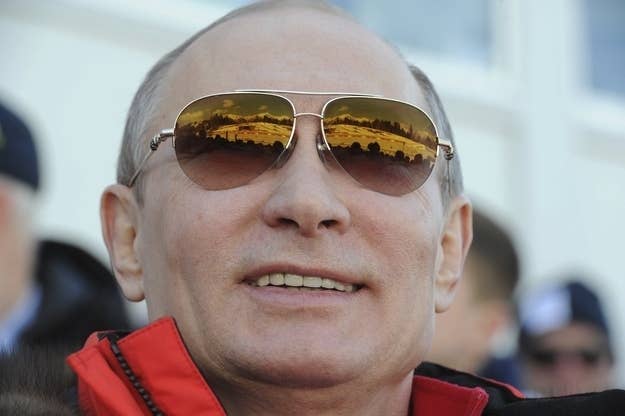
For years, foreign policy wonks have been decrying the "new Cold War" paradigm. President Barack Obama said as much when he told Mitt Romney: "The 1980s are now calling to ask for their foreign policy back because the Cold War's been over for 20 years."
But what if the other side doesn't agree?
While the U.S. may have moved on from the Cold War and its zero-sum values, they were on display in Moscow on Saturday, where Russia's Federation Council voted unanimously to send Russian troops into Ukraine. There, the bogeyman wasn't the opposition leaders who ousted Viktor Yanukovych or the protesters in the streets.
"Yesterday, from various media, we heard how U.S. President Obama declared that Russia would dearly pay for her politics," Yury Vorobyov, the body's deputy speaker, told an emergency session called to hold the war vote. "I think these words of the U.S. president are a direct threat, and he crossed a red line, he insulted the Russian people."
The phrase "red line" was no accident, and not one thrown around often in Russia. It was a direct reference to Obama's much pilloried foreign policy disaster over Syria, something largely forgotten at home but constantly referenced abroad -- from Moscow to Tel Aviv to everywhere in between.
That's not to say that Obama, or any U.S. official, could have stopped Putin's march on Ukraine. That Putin sees the collapse of the Soviet empire as a disaster is fundamental to understanding what drives him. And Ukraine holds a special place in the heart of many Russians, who still fundamentally see it as the bit of Russia that got away.
But to say that Putin doesn't feel emboldened knowing that he faces no real challenge from abroad would also be untrue. The Obama administration and its supporters spun the Russia-backed deal to disarm Bashar al-Assad of his chemical weapons as a compromise in which everyone wins. But Putin doesn't believe in compromise. To him, there is winning and losing. And in that round, he won.
Ditto the departure of Michael McFaul, the outspoken professor-turned-diplomat who left Moscow last week after two years as ambassador. McFaul argued family reasons. The Russians, who were convinced that McFaul, an expert in revolution, was sent to Moscow by Obama to personally oversee Putin's overthrow, saw him as leaving with his tail between his legs. "Good riddance!" the Russian foreign ministry tweeted the day he announced he would go.
Fresh off these "wins" and the chest-thumping of the Sochi Olympics, Putin feels on top of the world -- and he's kind of right. The U.S. can threaten sanctions and boot Russia from the Group of Eight and other fancy global clubs -- but Russia will end up with a new piece of territory (and, judging by at least two Kremlin statements, Putin won't be stopping at Crimea but will march onward to eastern Ukraine, home to many Russian-speaking Ukrainians) and, perhaps more importantly, with the respect of the west.
For years, Russia has begged to be taken seriously on the world stage — its constant appeal to the United Nations Security Council, the only place where it has, until now, really been able to assert its authority. For years, it has played the role of the spoiler, disrupting U.S. plans largely because it could (thus the unabashed glee when it decided to not only not veto, but support, a humanitarian resolution on Syria last month).
Now it is time to lash out. Russia did this once before, in August 2008, when it intervened in a conflict between Georgia and its breakaway republic of South Ossetia. Back then there were fears that Russian troops would make their way to Tbilisi, the capital, and bring Georgia back into its fold. They were unfounded, and the five-day war ended with South Ossetia and Abkhazia, another breakaway region, declaring independence that only Russia and a handful of small countries recognized. Russia suffered no real consequences then -- and the conflict was quickly forgotten in the west.
Five and a half years later, and Russia is a different place. Challenged by a protest movement around his return to the presidency in early 2012, Putin emerged more paranoid than ever. He blamed those protests squarely on the U.S. state department, and remains convinced that, as, in his view, it did to despots from Egypt to Libya, Washington is working to unseat him. That violent protests should erupt in Ukraine, where Russia saw a U.S. hand in the Orange Revolution of 2004-05, didn't help. The sight of U.S. officials like Victoria Nuland and John McCain strolling around the Maidan only added fuel to the fire.
Now, Washington is left with few options in the short run. "Unless immediate and concrete steps are taken by Russia to de-escalate tensions, the effect on U.S.-Russian relations and on Russia's international standing will be profound," Secretary of State John Kerry said on Saturday. Officials have floated sanctions, and after speaking to Putin for 90 minutes tonight, Obama said he would stop preparations for an upcoming Group of Eight summit to be held in the Olympic city of Sochi.
The question now is whether Obama can look toward the long-term. Obama has tried to play nice with Russia, and been rebuffed at every turn. Russia will never cooperate on Syria. It will eventually try to disrupt Obama's "reset" with Iran. Putin has turned anti-LGBT into a tool of foreign policy. Now he is sending troops into Ukraine.
Obama has made dialogue and cooperation a cornerstone of his approach to the world. But what if some countries don't reciprocate?
